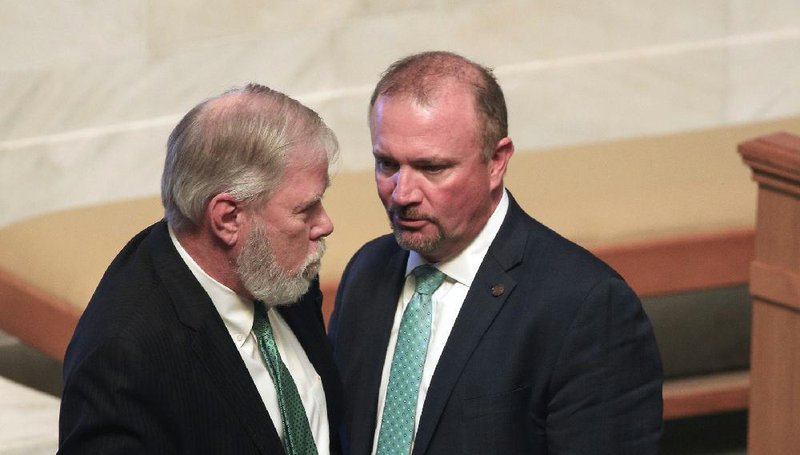The Arkansas House on Thursday voted to require out-of-state online retailers to collect sales taxes for products shipped to Arkansans, overcoming the objections of lawmakers who for years have likened the plan to a tax increase.
Gov. Asa Hutchinson's office on Thursday said he planned to sign the legislation, Senate Bill 576. First, it must receive concurrence from the Senate on House changes.
SB576, by Sen. Bart Hester, R-Cave Springs, also would lower corporate income taxes, extend the number of years businesses can carry over losses for tax purposes and change the way carwash businesses are taxed -- all in part to offset the additional $35 million in tax collections expected from online sales by 2021.
The Department of Finance and Administration estimated that online sales-tax collections would net cities and counties an additional $11.8 million.
"It's not fair for our local retailers, who provide jobs, who pay property taxes, who support our schools, who support our communities to be at a 10 percent disadvantage over online retailers," said Rep. Dan Douglas, R-Bentonville, referring to state and local sales taxes.
The bill is "a good economic development package, it's good for our retailers, it's good for our businesses," said Douglas, the House sponsor of the bill.
[RELATED: Complete Democrat-Gazette coverage of the Arkansas Legislature]
Previous attempts by lawmakers to force the collection of online sales taxes -- including one on the last day of the 2017 session -- had failed.
Some companies, including Internet retail giant Amazon, have already begun remitting taxes to the state without direct orders from the Legislature to do so. Walmart Stores, based in Bentonville, had supported earlier attempts to force online companies to collect the sales tax.
The House voted 68-20 to pass the tax bill. Opposition came almost entirely from Republicans, who have cast Internet sales-tax bills as tax increases. One Democrat voted against the bill.
"For a so-called conservative Republican Legislature, we have taxed the crap out of the state of Arkansas," said Rep. Josh Miller, R-Heber Springs. "When is it going to stop?"
A fiscal-impact statement compiled on SB576 did not calculate the net effect the bill would have on state revenue after factoring in all the changes to the tax code.
Some of the tax changes, such as a reduction in the top corporate income tax rate from 6.5 percent to 5.9 percent, would be phased in over time.
The total cost of that tax cut, after fiscal 2023, was estimated by the finance department to be $39.4 million.
The aspect of the bill that proved most contentious were changes to how carwashes are taxed.
The state currently applies sales taxes only to carwashes if an employee touches the car to clean it, Douglas said. As passed by the Senate, an earlier version of SB576 would have added new fees on automated carwashes.
One chain of automated carwashes, Zips Car Wash, complained that the changes would have cost the company about $440,000 a year in state taxes. It took out a full-page ad in the Arkansas Democrat-Gazette to protest the bill.
An amendment to the bill in the House changed the fee structure, and the chief financial officer of Zips Car Wash later told the newspaper that the company would support the bill with the compromises. The state is expected to lose about $3.2 million a year in revenue because of the changes in carwash taxes.
Both the Arkansas Municipal League and the Association of Arkansas Counties testified in favor of SB576 in committee. State Chamber of Commerce President Randy Zook called the bill the "No. 1 priority for this session for the members of our organization."
Douglas said the U.S. Supreme Court's 2018 decision in South Dakota v. Wayfair Inc. paved the way for SB576 on the legal front because the decision overturned more than 15 years of precedent and allowed South Dakota to require online retailers to remit sales taxes.
The Supreme Court's decision had not been in place when Arkansas lawmakers last considered a similar proposal in 2017.
Information for this article was contributed by Michael R. Wickline of the Arkansas Democrat-Gazette.
A Section on 04/05/2019
